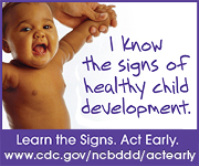_CDC "Learn the Signs. Act Early." National Campaign

- Fact Sheets
- Resource information
- Autism Case Training Curriculum
- And much more
http://www.cdc.gov/ncbddd/actearly/index.html
The Centers for Disease Control and Prevention’s (CDC) National Center on Birth Defects and Developmental Disabilities (NCBDDD), in collaboration with a number of national partners, launched a public awareness campaign called “Learn the Signs. Act Early.”
"Learn the Signs. Act Early." builds on familiar experiences of parents, such as monitoring their children’s physical growth, and expands to social and emotional milestones such as how children speak, learn, act, and play. Just as taking a first step is a developmental milestone, so is smiling, pointing and enjoying social play. While every child is different and develops at his or her own pace, there are still milestones that each child should reach within a certain range of time. The early identification of developmental concerns allows parents to seek intervention during the crucial period of early development.
Key Objectives:
"Learn the Signs. Act Early." builds on familiar experiences of parents, such as monitoring their children’s physical growth, and expands to social and emotional milestones such as how children speak, learn, act, and play. Just as taking a first step is a developmental milestone, so is smiling, pointing and enjoying social play. While every child is different and develops at his or her own pace, there are still milestones that each child should reach within a certain range of time. The early identification of developmental concerns allows parents to seek intervention during the crucial period of early development.
Key Objectives:
- Educate parents about key developmental milestones.
- Increase health care and childcare provider awareness of the importance of early intervention in diagnosing and treating developmental disorders such as autism.
- Increase parent-provider dialogue on the topic of child development and developmental disorders.
- Increase early action on childhood development disorders. Specifically, seek to increase screenings and early intervention among children with potential developmental disorders.
